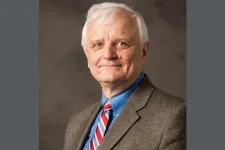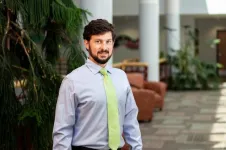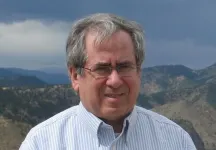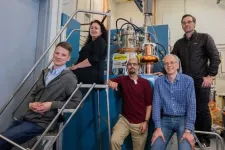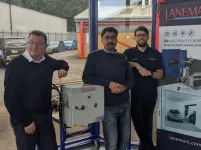(Press-News.org) We are all aware of the dangers of pollution to our air, water, and earth. In a letter recently published in Nature Human Behavior, scientists are advocating for the recognition and mitigation of another type of environmental pollution that poses equivalent personal and societal dangers: information overload.
With the internet at our fingertips with smartphones, we are exposed to an unprecedented amount of data far beyond our ability to process. The result is an inability to evaluate information and make decisions. Further, it can lead us to limit our social activities, feel unsatisfied with our jobs, as well as unmotivated, and generally negative. Economists estimate that it all comes at a global cost of about $1 trillion. On top of the emotional and cognitive effects, contextual and environmental considerations may add to the personal and economic costs.
The idea to explore information overload was incubated in a meeting of an international group of scientists two years ago, all of whom were supported by an E.U. grant for international collaboration. The E.U. team selected partners abroad including, for the third time, Rensselaer Polytechnic Institute’s Network Science and Technology Center (NeST), led by Boleslaw Szymanski, Ph.D., professor of computer science, in the United States.
The researchers compare information overload to other historical shifts in society: open publishing brought about the need to filter out low-quality research from the vast number of accessible publications, the Industrial Revolution gave rise to air pollution, and environmental activists have helped usher in legal and economic changes to help curb pollution. Similarly, so-called “information pollution” or “data smog” must be addressed.
Through the lens of computer science, there are at least three levels of information overload: “neural and cognitive mechanisms on the individual level… information and decisions at the group level… (and) societal level interactions among individuals, groups, and information providers.” These levels do not operate independently, so the flow of information may be treated as a multilevel network with nodes, which may give rise to an abrupt change. The researchers cite teamwork as an example: one team member’s information overload may cause the group’s performance to be hindered. It is a complex problem.
“We are calling for action in science, education, and legislation,” said Szymanski. “We need further interdisciplinary research on information overload. Information ecology must be taught in school. We also need to start the conversation on legislative possibilities, akin to the Clean Air Act in the U.K. decades ago.”
“Information overload can have severe implications,” said Curt Breneman, Ph.D., dean of Rensselaer’s School of Science. “It begins by eroding our emotional health, job performance, and satisfaction, subsequently influencing the actions of groups and ultimately, entire societies. I hope that Dr. Szymanski’s letter, written with colleagues from across the world, will raise public awareness of the problem and enable solutions to be studied and implemented.”
Szymanski was joined in authoring the letter by Janusz A. Hołyst of Warsaw University of Technology, the principal investigator of the E.U. grant; Philipp Mayr of the Leibniz Institute for the Social Sciences; Michael Thelwall of University of Sheffield; Ingo Frommholz of University of Wolverhampton; Shlomo Havlin and Alon Sela of Bar-Ilan University; Yoed N. Kenett of Technion – Israel Institute of Technology; Denis Helic of Modul University Vienna; Aljoša Rehar and Sebastijan R. Maček of Slovenian Press Agency; Przemysław Kazienko and Tomasz Kajdanowicz of Wroclaw University of Science and Technology; Przemysław Biecek of Warsaw University of and University of Warsaw; and Julian Sienkiewicz of Warsaw University of Technology.
About Rensselaer Polytechnic Institute:
Founded in 1824, Rensselaer Polytechnic Institute is America’s first technological research university. Rensselaer encompasses five schools, over 30 research centers, more than 140 academic programs including 25 new programs, and a dynamic community made up of over 6,800 students and 110,000 living alumni. Rensselaer faculty and alumni include upwards of 155 National Academy members, six members of the National Inventors Hall of Fame, six National Medal of Technology winners, six National Medal of Science winners, and a Nobel Prize winner in Physics. With nearly 200 years of experience advancing scientific and technological knowledge, Rensselaer remains focused on addressing global challenges with a spirit of ingenuity and collaboration. To learn more, please visit www.rpi.edu.
Contact:
Katie Malatino
Senior Communications Specialist
malatk@rpi.edu
838-240-5691
For general inquiries: newsmedia@rpi.edu
Visit the Rensselaer research and discovery blog: https://everydaymatters.rpi.edu/
Follow us on Twitter: @RPINews
###
END
URBANA, Ill. – Early childhood is an important time for learning about nutrition and establishing healthy eating behaviors. Young children rely on parents to provide food options, and the availability of food in the home affects their dietary choices. A new study from the University of Illinois Urbana-Champaign looks at changes in home food availability and nutrient intake for children from 2 to 4 years old.
“It's important to understand how the environments that children are in can influence their diet and nutrition. What types of foods and beverages are available in the home, and how accessible ...
Cell division is the generative spark of nearly every lifeform on Earth. But if healthy growth goes unchecked, cell division can turn lethal, overwhelming the organism. Such is the case with so-called oncogenes. When altered by a mutation, these growth-moderating genes go haywire, producing a geyser of cancer cells as a result. Oncogenes are also insidiously adept at generating tumors that over time become genetically “independent” from their origin, so it has been exceedingly difficult for scientists to shut down their replication ...
Clay Wright, assistant professor in the College of Agriculture and Life Sciences’ Department of Biological Systems Engineering, was awarded a prestigious Maximizing Investigators' Research Award (MIRA) from the National Institute of General Medical Sciences, part of the National Institutes of Health.
The funding is aimed at providing the investigator, versus a specific project, enhanced stability and flexibility for further discovery, enhancing scientific productivity and the chances for significant breakthroughs outside the initial scope of the project.
This recognition supports Wright's innovative work in understanding ...
Increasing shade cover over coffee plants can increase biodiversity and provide new ways to combine agriculture and conservation, a new study has revealed.
Coffee grown in high shade, with more than 30% canopy cover, provides a home to more plant and animal species than coffee grown in the sun or on low shade farms with less than 30% canopy cover, the study found.
Preserving biodiversity is good news for farmers as it means better natural pest control, and improved soil ...
Building on what was learnt to one's cost during the pandemic to improve health management in the future. This motivation has led scholars and researchers to take up the topic and investigate various aspects beyond the emergency phase.
Just recently, an article by the first signatory and corresponding author, Giuseppe Alessandro Veltri of the Department of Sociology and Social Research of the University of Trento, focused on the public health guidelines adopted during the pandemic. The research team assessed the effect perceived ...
WASHINGTON – U.S. Naval Research Laboratory (NRL) researcher, Lawrence Rosenblum, Ph.D., was elevated to the prestigious grade of Fellow of The Institute of Electrical and Electronics Engineers (IEEE) in the class of 2024 for leadership in developing mobile augmented reality, visualization and visual analytics of complex data. Fellow is IEEE’s highest member grade and is awarded through a rigorous review process only to candidates with extraordinary accomplishments.
Rosenblum joined NRL’s Acoustics Division ...
Sparks fly when a female nematode meets her mate in a Petri dish. Tracking him by smell, she beelines over and is pregnant within moments of physical contact. But for the hermaphroditic version of these tiny roundworms, it’s a very different story. Anatomically female but capable of self-fertilizing with their own supply of sperm, hermaphrodites remain emphatically uninterested in mating—until their sperm supply runs dry. Only then will they seek out males.
Within such previously unknown details about microscopic mating rituals ...
NEWPORT NEWS, VA – Superconducting radiofrequency (SRF) technology allows particle accelerators to efficiently produce powerful electron beams. Physicists use these beams to study the building blocks of matter at the U.S. Department of Energy’s Thomas Jefferson National Accelerator Facility. But these research machines also have a promising list of industrial applications. Now, some researchers are figuring out how to get SRF accelerators out of the lab and into industry.
One potential industrial use is in water treatment plants.
Per- and polyfluoroalkyl substances (PFAS) are present in many products, including certain non-stick cookware, water-resistant ...
Mounting evidence suggests that FDA-approved weight loss medications, such as Wegovy, not only help patients lose weight but also protect against complications from obesity such as cardiovascular disease. In 2021, 40 percent of patients enrolled in Medicaid had obesity. The high cost of these drugs has raised concerns about affordability, both for patients and public insurance programs.
Researchers from Brigham and Women’s Hospital, a founding member of Mass General Brigham, studied state Medicaid coverage policies for anti-obesity medications from 2011 through the first quarter of 2023, finding that 10 out of 47 states covered at least ...
Aston University is working with an engineering company to make industrial gas burners less environmentally damaging
It has entered a knowledge transfer partnership (KTP) with Lanemark Combustion Engineering
A KTP is a three-way collaboration between a business, an academic partner and a highly qualified researcher.
Aston University is working with an engineering company to make industrial gas burners less environmentally damaging.
The University has entered a knowledge transfer partnership (KTP) with Lanemark Combustion Engineering to ...
